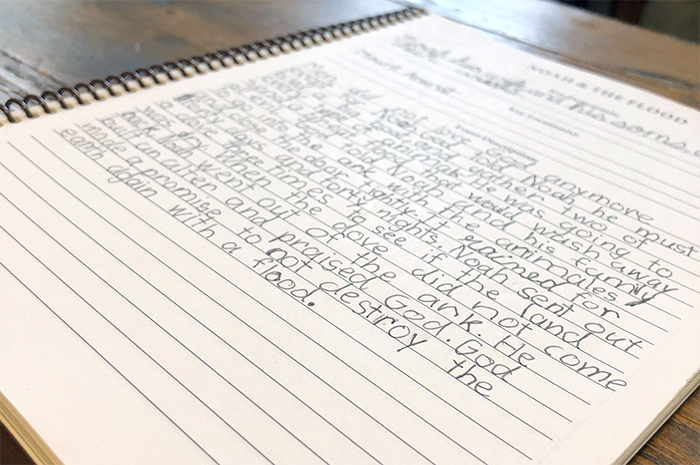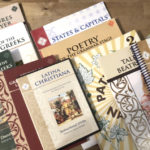
The argument over writing vs narration sets up a false divide and confuses overlapping approaches that have their own strengths and weaknesses. Narration, questions with written answers, and questions with oral answers all build different skills; so it’s important to use all three approaches, rather than using one to the exclusion of the others. Still, we need to understand what each approach really means so we can use each one well.
Note: I originally wasn’t going to publish this post, and actually abandoned writing it. Seeking Delectare is all about encouragement and practical tips, and I was afraid this post would be too “soap-boxish.” Since then, several people have said they want to know my thoughts on this topic. So I took that as a sign that I needed to finish this post and publish it.
I have no desire to stir a pot, but simply want to share what I’ve learned over the years. Writing this post has even reminded me to once again give narration a place in our own homeschool. All said, I hope you can hear my heart here. — Jen
The Controversy
While Charlotte Mason had a philosophical reason for avoiding questions, we moms tend to be more practical. We’re afraid of killing the love of learning in our children.
Writing is harder than speaking, both physically and mentally, so our children tend to push back on it. We then fear that making our children write answers will lead to frustration and a dislike of what they’re learning.
Writing also takes more time and, as homeschool moms, time is in short supply!
So we decide to let our children answer orally — or to forgo questions altogether and focus on narrations.
The thought is that, as long as the ideas are there, it doesn’t matter how they’re expressed. In the case of narrations, there’s the additional lure of children discovering and relating to a work on their own.
Defining our Terms
As you can see, there are overlapping concepts here: questions, written answers, oral answers, and narration.
In its purest form, narration is a philosophical approach that views questions as interruptions to a child’s thought process. Narration discourages anyone from coming between a child and the text before or during the narration.
“A few pedagogic maxims should help us, such as, ‘Do not explain,’ ‘Do not question,’ ….” (Charlotte Mason, Vol. 6, p. 304).
“A narration should be original as it comes from the child — that is, his own mind should have acted upon the matter it has received.” (Ibid., Vol. 1, p. 289).“When the narration is over, there should be a little talk in which moral points are brought out, pictures shown to illustrate the lesson, or diagrams drawn on the blackboard” (Ibid., Vol. 1, p. 233).
Classical education, however, sees questions as essential guides in the process of reading and learning from a text. This approach implements questions differently than other educational methods. They’re meant to guide a student back through a text or idea. They’re not a “tell me what you know” pop quiz disguised as a workbook page.
But there is still a lot of debate on whether written answers are necessary.
So we have two things to look at:
1. Whether questions or narrations are more effective
2. Whether writing or speaking is more effective when answering a question/giving a narration.
Questions vs Narrations
A good question requires a child to reflect on things they may not have understood while reading/hearing a text.
Narration requires the child to provide a summary of what they read/heard, relying on their own comprehension, memory, and insight.
The Pros and Cons of Questions
Questions can lead to high levels of engagement and appreciation on the part of the child. But only if the question is a good one!
Even the who/what/where questions of the younger years are an essential step towards this. While they can seem like busywork, they’re actually laying a strong foundation for deeper thought.
If a child struggles to find basic facts in younger texts, they will struggle even more when facts appear implicitly in later texts. And they’ll never be able to reach the how/why/compare/contrast stages of thought.
Each stage builds on the next and each stage is vital.
The downside is that children can become dependent on questions, rather than being attentive the first time through a reading.
Also, if questions aren’t implemented classically, they become busywork rather than guides.
The Pros and Cons of Narration
By its very nature, narration nurtures the habit of attention. It also encourages the development of discernment between primary and secondary details; otherwise, a child’s narration will go on interminably!
Unfortunately, oral narration does not assist the child in sharing their insights in other forms. I suspect this is one reason Miss Mason encouraged the addition of written narrations for older children. Drawings, recordings, and play-acting are other suggested forms in modern CM circles.
As a child ages, they’re expected to connect ideas from their current and past readings, forming an integrated web of knowledge and understanding.
The teacher can bring out short points after the narration is over; but the initial process, oral or written, leaves the child to grapple with the text on their own.
Why We Need Both
You may have noticed that the weaknesses of one method are the strengths of the other. That’s exactly why we need both!
The exclusive use of questions can leave a child unskilled in summarizing from memory. If poor questions are used, they can also stunt the ability to synthesize ideas.
Narration’s exclusive use can prevent a child from moving beyond their own insights. This can limit their understanding and their ability to be humble before the great ideas of the past.
The two methods must work together to form a well-rounded student.
For those who use or are interested in Memoria Press: the curriculum does include narration ideas in various student guide Enrichment activities (drawings, summaries, and the like). Classical Composition includes oral narrations in every lesson and the program’s paraphrase exercises are a form of written narration.
The difference is that these various narrations do not exist in a vacuum. They come after guiding the child through the text with vocabulary discussions, reading, and questions.
This supports the development of stronger, more in-depth narrations.
Written vs Oral Answers
I think this is the bigger issue in homeschool circles: is it important to write answers or not?
The Pros and Cons of Written Answers
There’s some debate as to whether speaking or writing is better for memory. There’s definitive agreement, however, that writing taps into our senses and creates essential neural pathways. When we write, we’re hearing (either audibly or mentally), seeing, and physically moving.
“According to Virginia Berninger, a researcher and professor of educational psychology at the University of Washington, ‘Pictures of brain activity have illustrated that sequential finger movements used in [cursive] handwriting activated massive regions of the brain involved in thinking, language, and working memory.’”
Iris Hatfield
Writing also models and develops grammar, spelling, and composition skills. This gives our children a firm foundation for written rhetoric — the art of persuasion. In a world where almost everything is discussed in writing (both online and in print), this is a priceless skill.
The Pros and Cons of Oral Answers
Writing is necessary, but children don’t have to write everything! Again, we need to form all sides of our children and speaking is part of this. Speaking well is a skill and oral answers can build it amazingly well.
As much as we tell each other to let things be answered orally, we actually shortchange this skill!
We tend to use it as a scapegoat, an easier, quicker, more enjoyable way to cover material.
But what if we looked at oral answers as what they truly are: a way to nurture the critical skill of speaking well? What if we continued to look for complete sentences and points that follow each other coherently? What if we expected a clear voice instead of muffled tones coming from the depths of a sweatshirt? #isurvivedhomeschoolingmiddleschool3times
It takes a few seconds longer to orally answer a question this way. We — and most of our children — are capable of that.
It’s Not “Either or Or”
At the same time, we have to avoid extremes.
We hear that writing is best and we determine to write every last thing. We hear that oral answers are best and we avoid writing like the plague.
Just like questions and narrations, we need both written and oral answers. I have some children who can write answers all day long, while struggling to answer the same question orally; but I have other children with the opposite struggle!
Again, for Memoria Press users: MP actually encourages both written and oral answers and uses both at their brick-and-mortar school, Highlands Latin.
It’s better to write some answers well, and orally answer some well, than to do one or the other half-heartedly.



My biggest homeschooling regret is not requiring writing (other than copywork) sooner. Sure, some children take to it like ducks to water, but then there are kids like mine who started off with only oral narration, and then when it’s time to transition to written, balk and ask “Why can’t I just tell you when that’s what I’ve always done?” I have thrown every reason his way… writing improves your grammar and spelling, helps really cement the content in your mind, makes you slow down and sequence events properly, creates a nice keepsake to look back on, because I freaking said so so just do it already, because this, because that… Nope. Now all my younger ones are doing short writing assignments (even just a name in a timeline or a drawing of an animal with its name and labeled parts) so I don’t have to go through that again!
I love how you’re scaffolding their writing expectations as they grow!
I am so glad you wrote this. As a homeschool mom who straddles the Classical & Charlotte Mason fence, I have seen the beauty and necessity of both oral and written work. I think more moms need to hear that you don’t have to do either/or, but rather choosing the best blend for your particular child. Thank you for sharing!
I agree with the need for both. I have always leaned towards the writing, for learning to spell and read. Now, with a child with dysgraphia, dyslexia, and ADHD I have had to shift to more oral dictation with me as the scribe.The physical act of writing can become overwhelming sometimes. It is a fine balancing act. Also, writing and speaking are both needed for multisensory learning: visual(see), auditory(hear/speak), and kinesthetic-tactile (feel in mouth and physically writing). Thanks for sharing !
“It is a fine balancing act.” This is so true! But it sounds like you’re hitting that balance between needed accommodations and continuing to build up areas of challenge. Your son is incredibly blessed to have you. Hang in there, mama!
Love this and agree with it wholeheartedly! Thank you for putting this into writing for all of us to learn from. 🙂